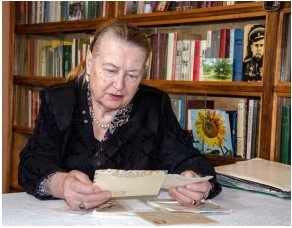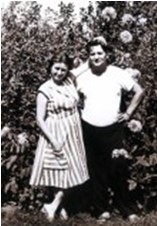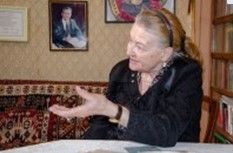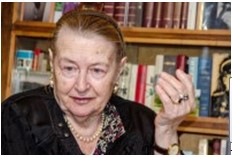Valentina HONCHAR: “We live in a time when almost no one needs literature.”

The house on the corner of the capital’s Bohdan Khmelnytsky and Mykhailo Kotsyubynsky streets is nominal.
In the late twenties of the last century was named Rolit – an abbreviation of “Workers’ Cooperative
literature “. Researchers say that within its walls in different parts lived about 130 famous writers
artists. The whole “iconostasis” of memorial plaques on the facade reminds of it. Through the abundant greenery
ivy enveloping the base of the house, as if looking through a veil of oblivion at the human street bustle
bronze, granite faces of idols of the past. I remembered: “Sic transit gloria mundi” «
Once Andriy Melnychuk, an elder of the Ukrainian Journalists’ Department, told me how he recorded an interview with
Oles Gonchar. Unfortunately, the latter for the writer. So the idea of a documentary film project arose,
dedicated to Oles Terentiyovych.
And here in the winter evening Andrey Vasilyevich and I in Gonchar’s apartment, communicate with the writer’s wife
Valentina Danylivna is almost the only long-lived Rolita. While the film crew exposes the lights, the cameras,
sound, we inspect the location – the office of a classic of Ukrainian Soviet literature. Valentina Danylivna saved
everything was as it was for a man: a massive desk, a comfortable carved and inlaid chair, armchairs for
guests. On the walls – a steppe landscape with Cossack riders brush favorite Goncharev artist Sergei
Vasylkivskoho… Paintings, souvenirs, diplomas… And shelves with books…
– Oles Terentiyovych after demobilization came to Dnipropetrovsk University at the end of 1945, on
4th year of the Ukrainian branch of the Faculty of Philology, – recalls Valentina Danylivna. – But for the first time
saw him in May of the following year. I just heard that a handsome guy, a poet, came from the front. Then
impressed by his poem “Tankist”, published in the magazine “Ukraine”:
Because it’s an unfulfilled dream,
So his loyalty to someone –
The inscription on the tank is white:
“Wait – I’ll be back!” The poem struck to the depths of the soul. We met in May, and in June he had already written to a friend: “Obviously I am
I’m getting married, because the nights are like this… ”Oles Terentiyovych was such a pure and honest man. I was then struck by:
man after the army, the war is over… Only kisses were – everything! I didn’t even think of that
to approach somehow… Absolutely honest with oneself and one’s conscience.
The poem struck to the depths of the soul. We met in May, and in June he had already written to a friend: “Obviously I am
I’m getting married, because the nights are like this… ”Oles Terentiyovych was such a pure and honest man. I was then struck by:
man after the army, the war is over… Only kisses were – everything! I didn’t even think of that
to approach somehow… Absolutely honest with oneself and one’s conscience.
Oles Terentiyovych was most outraged, perhaps, by the fact that after the publication of the story “Blue Stone” – about
love of a Soviet soldier for a foreigner – an article appeared, an advanced article in the central party newspaper
some Stolyarchuk (I remembered this name very well), in which the author of the story was accused… even
in betrayal of the homeland. Such a serious accusation then led to a lawsuit. Oles Terentiyovych
discussed at all party meetings, pushed on it as soon as they could. There was even an exception
university. Many turned away from him, began to avoid communication and meetings with him. Oles
Terentiyovych was even on the verge of suicide. Passed the fronts, survived the trenches, deadly battles, stayed
alive, and here…
– Oles Honchar then wrote: “I go out into the world with a brand on my forehead. … I am paralyzed. … Would like one,
so that literature detaches itself from me, does not haunt me like a mania. Otherwise she will execute me. Maybe
already executed, if not for the skinny girl’s shoulder, on which I leaned… »
– I was there, I accepted everything as it was – as a blow of fate. She believed in her feelings and did not blame Olesya
Terentiyovych in nothing. His only friend is Vasyl Berezhny, he lived in Kyiv and wrote a letter like him
outraged as he protests against this campaign. There was another poet – Kostya Drok and his wife Lisa
Filkinstein, they also behaved decently, did not back down from Oles Terentiyovych… Despite everything, he started
to work on the “Alps”, he got to work, it fascinated him. Apparently, the work forgot how it was “done”
at all party meetings.
– Oles Honchar’s front-line diaries mention his feelings for Slovakia. It was
is that
– It was. This is in Slovakia, her name was Yulechka. He really fell in love with this girl, a Slovak, and when we are
went in 1980, stopped in the town of Grinev. I knew this story, but this topic was not raised.
Understood the situation: a soldier who survived the whole war, survived, and he naturally had a feeling
love for such a beautiful woman… You see, it all comes down to an intimate topic, not to what figure
for culture was Oles Honchar. For some reason they do not mention that when he wrote in “Tronka” about the military range
Kherson region, atomic radiation from which destroyed the health of people, children, the military
the authorities moved the landfill to another location. This is an important detail – how literature has contributed to our lives
generation. Or in the “Cathedral” Oles Terentiyovych wrote that the collective farmers do not have passports. And when in Moscow
read the novel, and then introduced a passport system for peasants. In those days, literature was still direct
affected life. Oles Terentiyovych fought against nuclear energy, opposed construction
Chyhyryn nuclear power plant, against the creation of an industrial zone near Tarasova mountain, “Kaniv sacred mountain”, as he
called. She was like that for all of us. Nowadays, journalists are more interested in the secondary than the main. On
Unfortunately, we live in a time when almost no one needs literature. How many letters of thanks he received
Oles Terentiyovych from readers, how they supported him! Now there are writers who do not recognize the style
Oles Honchar. They do not recognize because they believe that he is a romantic, and Oles Terentiyovych believed that literature
it must be a step higher than life, an example for contemporaries, for generations.
– Oles Honchar was an incorrigible romantic, and in our time of total pragmatism is there a place
romance?
– Oles Terentiyovych just did not accept classical romance. He was for poetic realism. That is, for
the realities of life, in which there must be a little poetry. Not romance, but poetry. I don’t know how now. And now,
apparently, there are people who care about cleanliness, about normal decent relationships. Although now they have a lot of weight
pragmatic, very mercantile, maybe even those who are on the verge of dishonesty. But, obviously, romance too
is.
– If Oles Terentiyovych lived today, how would he perceive our current realities?
– I think he would stay in the positions he was in. In life he was not mercantile, was not
pragmatic. He considered himself rich enough to be somewhat independent. He was very
an impractical person, detached from everyday problems. I’ve always wondered: in a relationship with
people Oles Terentiyovych was, perhaps, gloomy, did not try to please. And if he didn’t like something,
he could say it out loud: he was absolutely honest with himself. It is said that Oles Terentiyovych served the system.
He used the system because he knew he could not overcome it. We used to be in Moscow, on Red Square,
there was just a parade. And then he said to me, “Look, that’s all against us.” What, he could overcome that system?
He said that he could give up membership in the Central Committee, but maybe he ordered a word for someone there. It was
deputy from the Kherson region, he was often approached by people with requests. With a “crust” he went freely to the Central Committee,
to the government, the ministry and demanded either the permit for the teacher, or any machine for vocational schools. That is, he is
used this system. I think so. We always, when we came to Moscow for the session of the Verkhovna Rada, he
stood in line for a taxi. Never allowed yourself to use your home forms,
private affairs. – After the creation of “Banner Bearers”, an epic canvas about recent turbulent events, Oles Honchar
“Immersed” in history, began to write about Tavria, Kherson region… Why?
– After the creation of “Banner Bearers”, an epic canvas about recent turbulent events, Oles Honchar
“Immersed” in history, began to write about Tavria, Kherson region… Why?
– And what to write about? Stalin should have been praised, but he did not want to do so. It is now believed that he was
at the top of the system that served that system. Oles Terentiyovych all his life took care to present with dignity
Ukraine at international meetings to know about Ukraine. He was constantly accused of nationalism. Over
he “hung” captivity all the time. Yes, he was taken prisoner, but he did not raise his hands, did not give up. This is ours
military commanders made it so that in 1942 he got into this “cauldron” near Kharkiv. But he passed
concentration camp on Cold Mountain, he survived all the hardships of captivity. And he resigned – and again to the front, on
advanced.
– Oles Honchar himself noted: the “post-war front” turned out to be the most difficult for him. As it was written
“Cathedral”, remember?
– Oles Terentiyovych wrote “Cathedral” with me. He dictated, I had a typewriter on my lap. Ivan came in
Drach says: “Now I know how to write novels.” For the first time Trinity Cathedral in Novomoskovsk, a prototype
described in the novel, Oles Terentiyovych saw in the summer of 1941, when their student volunteers
(student battalion of Kharkiv University – AM) was brought to Dnipropetrovsk region.
There was Oleksiy Vatchenko, he was the principal of my school, I studied with him. Vatchenko, at that time already
the first secretary of the Dnepropetrovsk regional committee of KPU, considered that Oles Terentiyovych «Cathedral» wrote against it,
although this is not the case. I remember well when Oles Terentiyovych came to Lomivka, where we lived with my mother,
he went to a nursing home in the Orliv region (it is not far from the cathedral), and said very excitedly:
the shoulders of a man whom his son gave to a nursing home cried today. ” And it turned out to be a similar story
was in Vatchenko’s family. Although Oles Terentiyovych, bringing out in the novel the image of a certain Volodka Loboda, who
escorted his father to live to old age in the “house of labor veterans”, did not mean the leader
Dnepropetrovsk Communists.
– A person is already experienced, with a certain status in society, but it was still difficult?
– Very difficult. Somewhere in his diary he wrote: “I live under a pressure of 1000 atmospheres.” He was then going to prison
planted, but saved readers: the flow of letters in his defense was enormous.
 – What episode from your life together do you remember now?
– What episode from your life together do you remember now?
– We had our own car, there was a driver, and Oles Terentiyovych learned to drive a car. He once wrote to me (somewhere
there is in the letters), who broke all the pillars in Dnepropetrovsk – could not drive a car then. We loved to ride in
Crimea, and somewhere along the way (I also once enrolled in driving courses, wanted to study), I remember, Oles
Terentiyovych walked, looked at the steppes, he loved to be in the steppes, to dream, to think about his works… Without
in the end, he only did what he thought was how to improve, how to improve his work. And it ended up being me
waited, waited, got behind the wheel and drove so far that he then had to march, catch up
the car. That’s it. And many things have been forgotten… There is almost no one left from Oles Terentiyovych’s generation.
I told you that I am not a heroine, and you should not make me a heroine, I am just a worker, a great worker…


